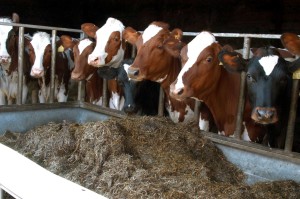Meeting livestock nutritional requirements is extremely important in maintaining performance of neonatal, growing, finishing and breeding animals. From a practical standpoint, an optimal nutritional program should ensure adequate intakes of amino acids, carbohydrates, fatty acids, minerals, and vitamins by animals through a supplementation program that corrects deficiencies in basal diets.
The essential nutrients required by grazing animals are water, energy, protein, minerals, and vitamins.
Water: Water is essential for all livestock. The amount of water required depends on the physiological stage of the animal and the climate. Lactating animals require more water, and the amount of water required increases as atmospheric temperature increases. Water availability should be closely monitored because a deficiency in water will result in death much faster than a deficiency of any other nutrient.
Protein: The amount of protein supplied in the diet is more critical than the quality of the protein. Ruminants have the ability to convert low-quality protein sources to high-quality proteins through bacterial action. Microbial protein synthesis is sufficient to supply the protein needs as long as adequate precursors are supplied, except during lactation for high milk producing animals. Protein is required by all grazing animals for tissue growth and repair.
Vitamins and Minerals: Ruminants require fat-soluble vitamins (A, D, E, and K), but they can synthesize the B vitamins in their rumen. Normally, the forage and feed supply contain all essential vitamins in adequate amounts, except vitamin A which is obtained as carotene from green plants. Salt is essential for many body functions and important to maintain intake of feeds and water. Calcium and phosphorus are needed to maintain growth, feed consumption, normal bone development, and reproductive efficiency. Other nutrients and minerals such as vitamin E and selenium are important for maintenance of healthy bodies and reproduction.
Overall, the proper balance of protein, energy, vitamins and all nutritionally important minerals in diets is needed to make a successful nutrition program that is both productive and economical. Both fundamental and applied research are required to meet this goal.

